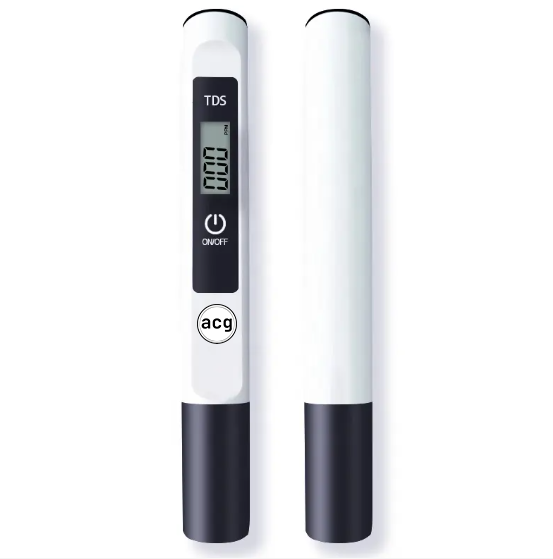acg TDS Meter
$14.95
Consistently testing your water is the most dependable method for ensuring that the water flowing through your espresso machine falls within a safe range. TDS, an abbreviation for “Total Dissolved Solids,” represents the overall mineral concentration in your water. Excessive levels can lead to troublesome scale accumulation inside your machine over time. Although the TDS meter gauges mineral content rather than total hardness, it remains essential to examine your water to determine if an additional water-softening solution is required for your equipment. This convenient tool consistently provides precise TDS readings.
Product Description
What is a TDS Meter?
A TDS meter, also known as a Total Dissolved Solids meter, is a device used to measure the concentration of dissolved solids in a liquid. It is commonly used in various industries and applications, including water quality testing, hydroponics, aquariums, and manufacturing processes.
TDS refers to the total amount of inorganic and organic substances dissolved in water or any other liquid. These substances can include minerals, salts, metals, ions, and other dissolved particles. The TDS meter measures the electrical conductivity of the liquid, which is directly related to the concentration of dissolved solids.
The TDS meter typically consists of a handheld device with a digital display and a probe or sensor. The probe is inserted into the liquid being tested, and it uses electrical conductivity to estimate the TDS level. The meter provides a numerical value that represents the TDS concentration, usually measured in parts per million (ppm) or milligrams per liter (mg/L).
TDS meters are valuable tools for assessing water quality and purity. In applications such as aquariums or hydroponics, they help monitor the nutrient levels in the water. In industrial processes, TDS meters assist in evaluating the suitability of water for specific purposes and monitoring the effectiveness of water treatment systems.
It’s worth noting that TDS meters measure the overall concentration of dissolved solids but do not provide information about the specific types of substances present. For a detailed analysis of the constituents in water, additional testing methods may be required.
Why Use a TDS Meter
To ensure that the water used in your espresso machine is within a safe range, you can follow these steps to test it:
Use a water testing kit: A water testing kit specifically designed for testing the quality of drinking water. Look for a kit that includes tests for pH, hardness, total dissolved solids (TDS), and chlorine.
Test the pH level: The ideal pH range for water used in an espresso machine is between 6.5 and 7.5. Use the test strips or solution provided in the water testing kit to measure the pH level of your water. Follow the instructions provided with the kit to obtain accurate results.
Measure water hardness: Water hardness refers to the concentration of minerals, primarily calcium and magnesium, in the water. High levels of hardness can lead to scale buildup in your espresso machine. The hardness is usually measured in grains per gallon (GPG) or parts per million (PPM). The ideal range for espresso machines is typically between 2 and 4 GPG or 34 and 68 PPM. The water testing kit will have instructions on how to measure water hardness.
Check total dissolved solids (TDS): TDS refers to the concentration of various dissolved substances in the water. It includes minerals, salts, metals, and other impurities. An acceptable TDS range for espresso machines is typically between 75 and 150 PPM. The water testing kit should provide you with the necessary tools to measure TDS accurately.
Test for chlorine: Chlorine is often present in tap water as it is used to disinfect it. However, chlorine can affect the taste of your espresso and potentially harm your machine. Test for chlorine levels using the provided test strips or solution in the water testing kit. The ideal chlorine level for espresso machines is generally less than 0.5 PPM.
Compare the results: Once you have completed all the tests, compare the results with the recommended ranges for pH, hardness, TDS, and chlorine levels. If your water falls within these ranges, it should be safe for use in your espresso machine. If any of the parameters are outside the recommended ranges, you may need to consider using a water filtration system or explore alternative water sources to achieve optimal water quality.
By regularly testing your water, you can ensure that it meets the necessary standards for your espresso machine, which can help maintain its performance and longevity while producing high-quality espresso.

Reviews
There are no reviews yet.